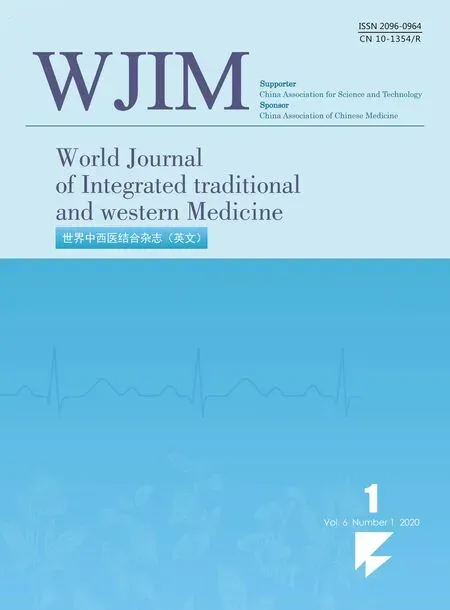New Year's Message
2019 was an extraordinary year for Chinese medicine, with significant milestones in scientific and political recognition. As we say in Chinese, "conditions bestowed from heaven,conditions on earth, and harmony in human action all came together" in a fortuitous manner.The Chinese scientist Professor TU You-you, won the 2015 Nobel Prize in Medicine and Physiology for the discovery and development of artemisinin. In September 2019, she was also awarded the Medal of the Republic. This was a great honor for the community of Chinese medicine practitioners and scientists working in the field of Chinese medicine. Many ordinary Chinese medicine workers were deeply encouraged and inspired by these events.
On October 26, 2019, in keeping with the theme of "Passing down the Valuable Essentials and Innovating with Integrity", the State Council of the Communist Party of China issued the document Instructions on Promoting the Inheriting and Innovating Development of Chinese Medicine. This was the first time since the establishment of the People's Republic of China that the Central Committee of the Communist Party of China and the State Council issued an official document on the development of Chinese medicine - a milesone event! The document pointed out the pathway for the inheritance, innovation and further development of Chinese medicine in the new era. The Instructions emphasize 4 main points. The first is to give full play to the unique advantages Chinese medicine has for protecting health throughout the life cycle. The second is to seek and discover the "treasures"within the tradition of Chinese herbal medicine, so that they can benefit all of humanity. The third is to train and cultivate Chinese medicine professionals so that valuable knowledge and skills can be passed on from generation to generation. The fourth is to support and encourage breakthroughs in innovation so that Chinese medicine can better benefit all of humanity.
Currently, there are serious challenges to achieving global health and wellness. The World Health Organization has emphasized that the WHO's sustainable development goal is to achieve universal health coverage by 2030, while at the same time actively giving a role to traditional medicine. In May 2019, the World Health Organization approved ICD-11, and established a standardized classification system for traditional medicine, including Chinese medicine, for the first time. This will enable countries around the world to make statistical studies based on traditional medical services and medical treatments, and to provide data on their safety and effectiveness. The official release of ICD-11 will help facilitate the promotion of the integration and development of Chinese medicine in health care systems around the world. This, in turn, will be conducive to achieving the arduous task of achieving universal health coverage.
The year 2020 is the 6thyear of the founding of the World Journal of Integrated traditional and western Medicine (WJIM). We have sincerely endeavored to implement the goals of the "Journals of Excellence"project of the China Association for Science and Technology. We have organized influential leaders in the field of academic journals, academic advisers, and experts on the executive editorial boards of many journals to conduct strategic seminars. We have focused our efforts on strategies to improve the quality of the journal,encouraging more authors to summit papers and to improving the quality of manuscripts that the journal receives.
In 2020, we will publish more articles on the scientific evidence-base for Chinese medicine, focusing on studies that respect the theory of Chinese medicine, have high clinical efficacy, and use the highest standard of scientific methods. We particularly encourage submissions on the clinical standardization of Chinese medicine, individualized treatment and its possible mechanism of action, and studies that aim to elucidate the medical conditions for which Chinese medicine offers patients the greatest clinical efficacy, particularly in comparison to biomedical treatments.
The English version of WJIM is still relatively new and lack experience. The successful publishing of the journal and overcoming difficulties relies on the strong support and selfless contributions from the editorial board, and the support and confidence of our authors and readers, WJIM has continued to grow since its founding. I want to take this opportunity to express our sincere thanks to the editorial committees and editors,who put in the hard work it takes to produce the journal; and to our readers and authors who have been supporting us from the beginning. We also want to thank the academic advisors to the Journal, who provide intellectual guidance to the journal, and to the many experts who review manuscripts for us.
After 6 years development, the English version of WJIM can better serve readers who seek high-quality articles on Chinese medicine and integrative Chinese and western medicine, improve the dissemination and communication of Chinese medicine, and play a greater role in the implementation of the "Belt and Road Initiative," the national strategy for developing Chinese medicine, and, ultimately, in building a global community that understands we share a common destiny and mandate to create the conditions for universal healthcare access.
We will unswervingly walk towards the goal of constructing a high level academic journal for Chinese and western medicine and continue to make our contribution to the international development of Chinese medicine. Let us not forget our original inspiration and motivations, and move forward bravely to confront new challenges.
 World Journal of Integrated Traditional and Western Medicine2020年1期
World Journal of Integrated Traditional and Western Medicine2020年1期
- World Journal of Integrated Traditional and Western Medicine的其它文章
- World Federation of Chinese Medicine Societies Center for Translation
- INSTRUCTION FOR AUTHORS
- Professor YANG Yu-fei's Experience on the Integrated Chinese and Western Medicine Treatment Strategy for Advanced Colorectal Cancer
- Two Definitions of Life Will Highlight on Physiological Understanding of Six Meridians
- Effects of Shenmai Injection (参麦注射液) Combined with Meglumine Adenosine Cyclophosphate Injection on Cardiac Function and Peripheral Serum Levels of TNF-α,TGF-β1 and IFN-γ in Patients with Viral Myocarditis
- Clinical Study on CT-guided Modified Akupotomye in the Treatment of Lumbar Nerve Posterior Branch Compression
